Rebecca Eanes's Blog, page 3
March 21, 2017
Don't Spit-Smudge My Face: Respecting Children's Personal Space
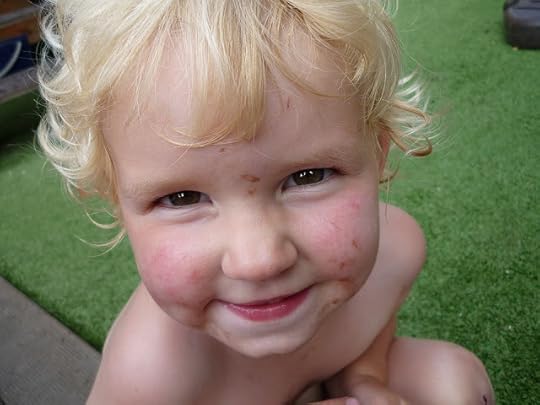
My son had food crumbs on his face. Absent-mindedly, I began wiping them off in the presence of others who were just feet away. Apparently, this was quite embarrassing for him. Of course, I didn’t mean to embarrass my child. In fact, I thought it would be more embarrassing for him to walk around school with crumbs on his face, but his look of disdain caused me to take pause and think of my actions. How would I like it if someone started wiping my face in front of my friends? My honest answer was, I wouldn’t.
I think of myself as a respectful parent. I honor my children as valuable human beings and do my best to treat their minds, bodies, and spirits with respect, and yet I realize that there have been many times when I have unintentionally disrespected their personal space. Let’s look at some of the common practices most parents do that we generally don’t think twice about.
Wiping Hands and Faces Without Warning
It would feel bazaar to say to a baby “I’m going to wipe the milk off your chin now” or to a toddler, “Your hands are sticky. I’m going to clean them with this wet wipe.” We usually wipe them clean without permission or often warning, but isn’t this rather rude? When I consider how I would feel if perhaps a waiter came up to me at a restaurant and wiped my face abruptly, I cringe. We wouldn’t dream of disrespecting an adult in such a way, but it is common practice in how we relate to children.
Scooping Them Up and Away
There have been countless times I have swooped in and scooped up my children without so much as a whisper of caution. Come to think it of it now, it probably gave them quite a fright! I can no longer do this because they’re half grown, but when they were little and light, I would scoop them up and away from undesirable objects and predicaments or just casually pick them up for a snuggle, and they never saw it coming.
Smacks, Slaps and Spankings
Still very common practices, many parents smack little hands away from outlets or hot stoves. They slap legs and spank bottoms to deter unwanted behavior, but these common methods disrespect a child’s body and dignity. While many still argue that the occasional smack or spanking is a necessary tool in child-rearing, I believe all humans have the right to protect their own bodies and that we send a dangerous message by violating this right with our young ones.
Tickles, Hugs and Kisses
I believe strongly in showing affection to our children, and I’m not going to assert that we must ask permission every time we want to hug them. What I am suggesting is that we be aware of the cues our children give us and know when to ask and when to back off. One of my children loves hugs but not kisses. Another despises tickling. I think it shows our children respect when we honor their wishes regarding tickling and affection and allow them to have a voice. Relatedly, it is quite common to expect children to hug and kiss family members they may not know well or feel comfortable with, and I think it is good idea to give children the option of a handshake or high-five in those situations.
Honoring Children by Giving Them a Voice
We can honor our children and show respect by starting when they are babies. Though it may feel silly at first, voice what you are doing as you change a diaper or wipe them down. I know they will not understand your words early on, but your gentle, respectful demeanor will be communicated nonetheless. As they grow, give warning before you pick them up, and explain why they mustn’t touch the outlet or get so near the stove. Point out the smudges on their faces and hand them a wipe, allowing them to take charge of keeping their bodies clean. Offer hugs and kisses often but never force them, and allow them the opportunity to say “no” to tickling and affection. Give them a voice by teaching them to say “Please don’t do that to me” or “I’d prefer a high-five, Uncle Jim.” Children are valuable, whole human beings from the beginning. Giving them the message “you are worthy of respect” from day one tells them they are safe with us and that we value them as people.
This article was originally published by Boston Parents Paper.
Published on March 21, 2017 08:45
Great Expectations: Holding Children to Higher Standards Than Adults

I once said in a book, “So often, children are punished for being human. They are not allowed to have grumpy moods, bad days, disrespectful tones or bad attitudes. Yet, we adults have them all the time. None of us are perfect. We must stop holding our children to a higher standard of perfection than we can attain ourselves.” This quote has gone viral, being seen by millions around the world, and has received mixed reactions by people who love and understand the meaning of the quote and by those who misunderstand it to mean we should let children by with being disrespectful.
I, of course, believe in teaching children to be kind, considerate and respectful. I believe in coaching them to have positive attitudes, and to be aware of their emotions and how to manage them. I also happen to believe this is best done by providing an example, and if I’m honest, when I listen and look at many of the adults around me, I’m just not seeing it.
We generally expect children to be on their best behavior at all times, yet this is a feat we can’t accomplish ourselves. Who of us has never lost our temper? Who of us doesn’t get grumpy or have a bad attitude from time to time? I’d be a hypocrite if I said I was always perfectly well-behaved, and I dare say most readers would as well. It is not possible, in our human condition, to be perfect, and if I, in all my nearly four decades, haven’t managed to attain perfection yet, why should I demand it of my children who have only be here a very short while?
Consider the way we behave toward children in contrast with the way we expect children to behave toward us. We tell children “hands are not for hitting” but the majority of Americans still spank their kids. We tell them to use “inside voices” but we yell at them when we are frustrated. We tell them to be patient but quickly become irritated at backed up traffic or other daily annoyances. We demand respect but humiliate them on social media. It seems to me that adults aren’t upholding the many values we try to impart on our children, and we aren’t behaving in the excellent manner in which we expect them to behave.
When I scroll through my Facebook newsfeed, I see name-calling and rude behavior. When I watch politics, I see much of the same. When I run errands, I hear cashiers being fussed at and bank tellers being yelled at. I worked in banking for more than a decade and was on the receiving end of many adult tantrums. I am not suggesting we are all bad people. It’s the opposite, in fact. We are mostly good people who, on occasion, behave badly.
As a parent, I’ve lost my temper and yelled at my kids. I’ve ran to my room and slammed the door. I’ve yelled at my spouse, hung up on telemarketers and said negative things under my breath to the person who cut me off in traffic. I’m not a bad person. I’m a human person. Our children aren’t bad kids. They’re human kids. They make mistakes. They get angry. Sometimes they’re rude or grouchy. It’s never OK to treat others badly, and of course they should be taught that, but when we correct them, let’s do so bearing in mind that we, ourselves, are sometimes guilty of the things we are correcting them for.
My opening quote isn’t a suggestion to lower the standard we have set for our children so much as it’s to raise the standard for ourselves. It’s a call to rise up to our own fullest potential as people and parents and behave in a manner suitable to be imitated. And it’s also a call for understanding and compassion because being a kid is hard sometimes. Being a person is hard, sometimes. We all need a soft place to land. As parents, let’s not fail to teach our children all the right things, but just as importantly, let’s not forget to wrap them in arms of grace and say, “I am your safe place. Here you will always be loved.”
*This post was originally published by Boston Parents Paper.
Published on March 21, 2017 08:40
March 17, 2017
This One Thing Helps Children Behave Better
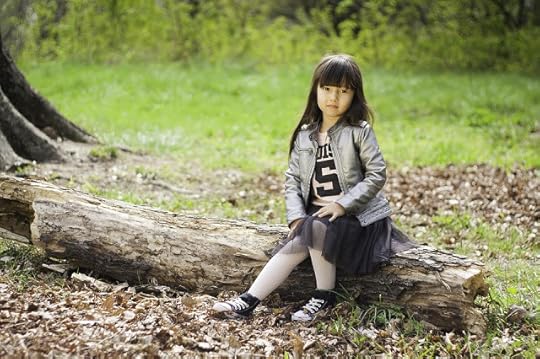
“You can’t teach children to behave better by making them feel worse. When children feel better, they behave better.” – Pam Leo
Nearly eight years ago, I found the above words by Pam Leo to be absolutely true, and this truth led me down the path of connection-based parenting for which I am so grateful to have followed. When I used punishments such as time-out and tricks like behavior charts, my son’s behavior became increasingly difficult and we were locked in what I perceived to be constant power struggles. I felt like my son was always struggling to gain the upper hand when really he was only struggling to regain our connection. When I provided his attachment needs, he felt better. He was able to rest in our relationship, and his behavior improved.
Much of today’s parenting advice is based on behavioral theory. Time-out, for example, is a result of B.F. Skinner’s work on operant conditioning. We tend to think in terms of positive and negative reinforcement because Skinner showed us that a hungry rat will quickly learn to push a lever for food (positive reinforcement) or push the lever to avoid being shocked (negative reinforcement). As a result, we spend our days handing out food pellets or shocking children (metaphors for punishments and rewards, of course) to condition them to behave how we want them to behave, but, as Alfie Kohn, author of Unconditional Parenting, explains, “Behaviors are just the outward expression of feelings and thoughts, needs and intentions. In a nutshell, it's the child who engages in a behavior, not just the behavior itself, that matters."
Here are 3 ways we help our child feel better, thereby helping them behave better:
Be the light reflector. While punishment may temporarily stop a certain behavior, it makes children feel bad about themselves, and when children feel bad about who they are, their behavior will reflect that. Rather than being behavior managers, we can become light reflectors (click the link to read more about becoming a light reflector). In this nurturing role, we simply reflect back the light that our children already possess. When they get off track, as humans do, we remind them of their goodness, their kindness, their willingness to help. We hold faith that their intentions are good, even when behavior is bad, and we guide them back to their true (good) selves.Use positive discipline. Positive discipline looks beyond behavior to the heart of the child. It seeks to determine why a child is behaving in a certain way so that the root cause can be fixed. Punishing or rewarding behavior is like slapping a Band-Aid on an open and bleeding wound. It might cover up the problem, but it doesn’t heal it. Positive discipline has 3 simple steps: Assess the need (find out what is driving the behavior), calm yourself and your child (because until you are both calm, your brains aren’t ready to engage with one another with empathy and the ability to solve the problem), and teach/problem-solve (look for a solution to the problem).Make unconditional love your top priority. Dr. Gordon Neufeld of The Neufeld Institute says this: “Unconditional parental love is the indespensible nutrient for the child's healthy emotional growth. The first task is to create space in the child's heart for the certainty that she is precisely the person the parents want and love. She does not have to do anything or be any different to earn that love - in fact, she cannot do anything, since that love cannot be won or lost...The child can be ornery, unpleasant, whiny, uncooperative, and plain rude, and the parent still lets her feel loved. Ways have to be found to convey the unacceptability of certain behaviors without making the child herself feel unaccepted. She has to be able to bring her unrest, her least likable characteristics to the parent and still receive the parent's absolutely satisfying, security-inducing unconditional love.” By offering our children our guidance along with unconditional love, we treat them not as rats in a box but as valuable human beings who have so much to contribute to our world.This post was originally published at Creative Child Magazine.

Published on March 17, 2017 17:05
How 10 Minutes of Joy Can Change Your Life

I’ve been thinking a lot about joy lately. After dealing with a bout of depression in 2016, I decided I wanted to wear joy like a suit of armor . I wanted my children to remember the sound of my laughter. I wanted them to remember my smile. I knew that the prior months didn’t offer much in the way of reaching either goal, and so I made it my mission to find simple strategies that would increase my joy. Did you know that if you carve out just 10 extra minutes a day to focus on joy, you’ll collect more than 60 joyful hours per year? Imagine how that could impact your life!
I got curious about just how an extra 10 minutes per day would impact my own motherhood and my life, so I added up how many joyful minutes I’d add over the next 9 years (until my youngest child reaches 18 and could potentially leave my nest). If I practice joy with my kids for just 10 extra minutes per day, I’ll gain 32,850 joyful minutes.
That might be 10 minutes of reading aloud.
10 minutes of Lego building.
10 minutes of Monopoly (okay, we all know Monopoly takes forever, but stick with me).
10 minutes of stirring the cookie dough and rolling it out.
10 minutes of snuggling.
10 minutes of listening.
Or talking.
10 minutes of undivided attention.
10 minutes a day equals 32,850 more minutes of happiness during their remaining childhoods.
32,850 more smiles my kids see.
32,850 more minutes of feeling loved, cherished, and seen.
32,850 more minutes of feeling connected.
32,850 more minutes of focusing on those that matter most to me.
I’ve been putting everything aside for at least 10 minutes each day to focus on seeing and feeling joy, and I can tell you that it’s making a difference. Slowly, I’m building up my joy armor. I feel happier and more connected to my people. I feel like time slows down just a little bit during that 10 minutes that I’m fully present and experiencing joy. I feel like I’m not missing out on life.
“This is joy” has become my mantra. I look for it and I say it out loud (or just in my head if there are strangers around who might think I’m super weird). When the boys have a mess of paint and clay all over my table, I say “This is joy.” They’re here. They’re still children. They’re creating. This is joy. When we all climb in bed at night for read aloud time, “This is joy.” When we watch a movie together, “This is joy.” When my son throws him arms around my waist from behind me and says “Love you so much Mommy Girl” I think “This is joy.”
And the joy is spreading! I can see it in other parts of my life and I speak it out often. When I’m folding laundry, “This is joy.” We have clean clothes. When I’m cleaning the house, “This is joy.” I have a home. When I’m walking the dog, “This is joy.” What a beautiful day. That may seem a little Pollyannish to some of you, but in days such as these, I believe we need to clothe ourselves in joy and use it like a shield. May our joy sustain us. May our joy spread across our homes and across our nations. What would 10 extra minutes of joy mean for you?
This article was originally published at Creative Child Magazine.

Published on March 17, 2017 16:42
March 2, 2017
When the World Says Your Child Needs Changing
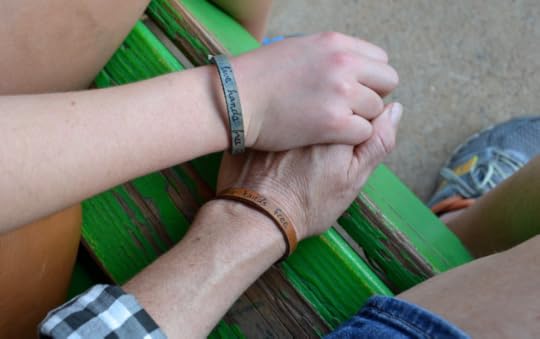
*I am so pleased to welcome Rachel Macy Stafford to the blog today! She is the NYT bestselling author of Hands Free Mama and Hands Free Life. Her new book, Only Love Today, will be released on March 7th. See the bottom of this post to find out how to get the book plus 4 bonus gifts!
Here's Rachel!**************
When my daughter was three, someone told me during a toddler music class that I needed to "toughen her up" because she was too sensitive and "would have a rough life ahead.” When my daughter and I got home, I looked into my child’s big, brown eyes that held so much promise and declared, “I will never ever ‘toughen you up.’ Mark my words. Someday, that tender heart inside you will be your gift.”
It wasn’t until I was cleaning out my daughter’s backpack six years later that I received confirmation for nurturing my child's tender heart rather than trying to change it. At the bottom of her book bag there was a speech she’d written and recited to her class before being voted class president in a mock election.My daughter wrote:"I would very much like to be your class president. I am hard working. I am very kind. I take care of the animals and the plants. I have self-control. I am very brave and honest. I am caring and a little curious. I am very smart and fun. I make a good leader. I care about other people. I am so exided to be one of the class presitents. Please vote for me."I cried as I held that paper.I cried for every little boy whose parents are told he is too rambunctious, too inquisitive, too loud.I cried for every little girl whose parents are told her head is in the clouds, that she is a daydreamer, and too much of a free spirit.I cried for every little boy whose parents are told he is too small, too weak, and too timid to ever play the game.I cried for every little girl whose parents are told she is too clumsy, too uncoordinated, too slow to ever succeed.I cried for the mother who was told her child needed to be toughened up and for ever year that mother waited for the moment she would know she had done the right thing by nurturing that tender heart.The moment was now.And there was cause for celebration. Not because I had been “right.” Oh no, there was something much more miraculous to celebrate.In the act of protecting, nurturing, and encouraging that overly sensitive heart at age three, my child’s gift had blossomed.And what was more important than the fact the world could see and appreciate her gift was the fact that she could see it herself.I shudder to think if I’d tried to change her, mold her into something she was not. What would I have destroyed in my beautiful child? I was certain she could have never written these words, her purpose, and her future in clear legible letters.But what about the others—the ones who are being told they are “too this” or “too that?” I want to protect their unique and beautiful inner lights too. May the following plea inspire you to step back and allow your loved ones to do things in their own way … in their own time … with their own flair. May this plea confirm what you’re feeling deep in your heart: To let them be who they are. Perhaps in time, you will see something that the world thought needed changing doesn’t need changing at all. Perhaps you will see something courageously brave and beautiful that is worth protecting and nurturing. Perhaps you already do. Don’t Change, Extraordinary One
They say he’s too quiet.
They say she’s too inquisitive.
They say he’s too energetic.
They say she’s too sensitive. They say these things thinking it will help,
But it doesn’t.
It only causes worry and the pressure to conform.
The truth is, changing would be a tragedy. Because when they say “too quiet,”
I see introspection.
Don’t change, thoughtful one.
You’re gonna bring quiet wisdom to the chaos. Because when they say “too inquisitive,”I see problem solving.Don’t change, little thinker.You’re gonna to bring answers to the toughest questions.
Because when they say “too energetic,”I see vitality.Don’t change, lively one. You’re gonna bring love and laughter to desperate times.
Because when they say “too sensitive,”I see heart.Don’t change, deep feeler.You’re gonna bring compassion to hurting souls.
Because when they say “too anxious,”I see caution. Don’t change, little protector.You’re gonna bring deliberation to tricky situations.
They might say change is needed. I ask that they look a little deeper and observe a little longer. From where I stand, these individuals are just as they should be–On their path to bring the world exactly what it needs to thrive.
Don’t change, extraordinary one. You’re gonna light this place up.
Editor’s note:
 This article is a small sample of what you will find in Rachel Macy Stafford’s highly anticipated new book, Only Love Today: Reminders to Breathe More, Stress Less, and Choose Love (release date 3/7). With a unique flip-open, read-anytime/anywhere format, this book is soulful encouragement for busy parents and individuals yearning to anchor themselves in love despite everyday distractions, pressures, and discord. “Only Love Today” began as a mantra to overcome her inner bully, but it is now the practice of Rachel Macy Stafford’s life. It can be a practice for all of us. Join Rachel and her supportive community at HandsFreeMama.com where you can also pre-order Only Love Today by March 7th and receive free bonus materials with your order. Follow Rachel on Facebook at The Hands Free Revolution! Join the #onlylovetoday movement!
This article is a small sample of what you will find in Rachel Macy Stafford’s highly anticipated new book, Only Love Today: Reminders to Breathe More, Stress Less, and Choose Love (release date 3/7). With a unique flip-open, read-anytime/anywhere format, this book is soulful encouragement for busy parents and individuals yearning to anchor themselves in love despite everyday distractions, pressures, and discord. “Only Love Today” began as a mantra to overcome her inner bully, but it is now the practice of Rachel Macy Stafford’s life. It can be a practice for all of us. Join Rachel and her supportive community at HandsFreeMama.com where you can also pre-order Only Love Today by March 7th and receive free bonus materials with your order. Follow Rachel on Facebook at The Hands Free Revolution! Join the #onlylovetoday movement! About the Author
About the AuthorRachel Macy Stafford is the New York Times bestselling author of Hands Free Mama, Hands Free Life, and soon-to-be-released, Only Love Today. Rachel is a certified special education teacher who helps people overcome distraction and perfection to live better and love more. Rachel’s work has been featured on CNN, Good Morning America, The Today Show, Global News, TIME.com, and FoxNews.com. Rachel loves taking long walks, baking, and volunteering with homeless cats and nursing home residents. Rachel lives in the South with her husband and two daughters who inspire her daily.
Published on March 02, 2017 03:00
February 21, 2017
The Wrong Question Parents Keep Asking
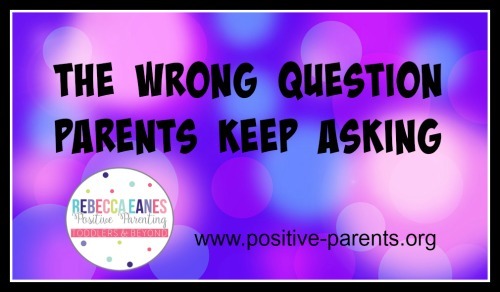
The questions we ask are important because obviously the answers that come to us are a result of what question we asked. So, asking the wrong questions gives us the wrong answers, and when we base our reactions, our relationships, our decisions, and our views on the wrong answers, we miss the mark. We end up on the wrong path and wonder why things aren’t working out properly and why it has gotten so hard.
This was the case for me eight years ago when my firstborn was three years old. I, like many other parents, asked one question over and over again. What do I do when…
What do I do when my child hits?
What do I do when my child doesn’t listen?
What do I do when he is defiant?
What do I do when he won’t sleep at night?
What do I do when…what do I do when…
It isn’t hard to find answers to these questions. The internet is full of them. Books and magazines are full of answers. Professionals, friends, family, everyone seems to have an answer for the “what do I do when” question, (all conflicting answers, of course) and the answer you accept will determine how you treat your child and the course of action you will take.
When I asked “what do I do when my child is defiant?” and the answer that came to me which I accepted was “put him in time-out,” our course was set. I continued to view him as defiant (because I had gotten an answer that reinforced my belief) and I consistently and continually placed him time-out just as I was told. Of course, it didn’t work. Our relationship suffered and his behavior only worsened. The more I looked for defiance, the more I saw of it, and pretty soon our days were filled with power struggles and tears, and every day I felt completely defeated.
It turns out that time-outs were the wrong answer because “what do I do when” was the wrong question.
Maybe you’ve found yourself in a similar situation, feeling like you are in a constant power struggle with your child and nothing is working the way you thought it would. Maybe your relationship is strained. Maybe you’ve been given the wrong answer because you, too, have been asking the wrong question. Here’s a better question.
WHY?
WHY is my child hitting?
WHY is my child not listening?
WHY is he defiant?
WHY won’t he sleep at night?
Why is this significant? Because WHY puts your focus on the person. What do I do when puts your focus on the problem. It completely shifts how you see your child and, therefore, how you react.
When I started asking why questions, you can imagine how the answers that came were completely different. The answer to “why is he being defiant?” was “because he feels disconnected.” The answer to “why does he feel disconnected?” was “because he has a new baby brother and it’s a big adjustment for him.” So, he didn’t need a time-out, he needed to reconnect with me. He needed to feel secure and attached. He needed me to focus more on special time with him, and when I did, his defiant behavior disappeared.
It’s not always easy to get at the why, but when we approach issues with curiosity and ask the right questions, the right answers will eventually come, and most often the right answer is connection .
*This piece was originally published at Creative Child Magazine.
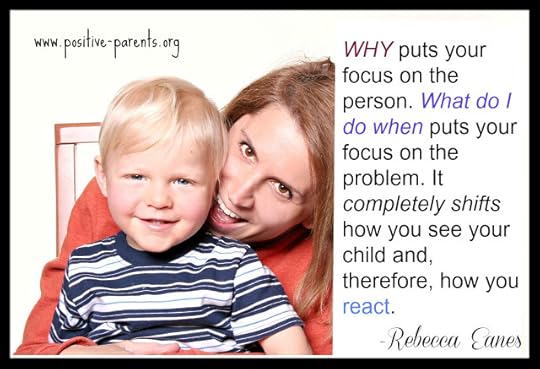

Published on February 21, 2017 14:09
February 12, 2017
Five Strengths of Sensitive Kids
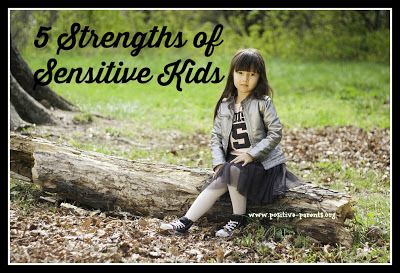
David Jones is credited for saying, “It is both a blessing and a curse to everything so very deeply.” My son has the highly sensitive trait (find out here if yours does, too), and while it has not been without challenges, I have noticed that high sensitivity also comes with these special strengths.
Creativity
Sensitive children often have vivid, wonderful imaginations which enable them to be very creative and artistic. My son won the “best artist” award in Kindergarten and more recently received an award for best animation in an arts class he took. He is always drawing and creating new characters and stories. He and his brother even have an entire movie series made up in their heads. Do you notice that your HSC (highly sensitive child) is artistic and creative, too?
Nurture this strength by allowing time and space to be creative. HSCs need a lot of down time, and being over-scheduled or constantly busy leads to higher stress levels. Give them the tools they need to create, such as an artist’s set, paint and a canvas, or an animation studio – whatever your child is into. Avoid making too many judgments of their creations, and be particularly careful of criticism which might squash their creativity. HSCs want to please, and if they think they’re not, they get discouraged easily and may give up. For example, rather than “that is your best drawing yet!” or “you used blue for the sun?!” simply remark about the time they spent working on it or something specific that you enjoy about it, then ask what they think. “I think the colors you used are lovely. What is your favorite thing about it?”
Highly Conscientious
HSCs are very emotional people, and they are also in tune with the emotions of others. This makes them highly conscientious. They usually have better-than-average manners and try to never hurt anyone’s feelings. They are considerate toward others and people are likely to remark on their good manners.
Nurture this strength by verbalizing your appreciation when they hold the door open for others, say please and thank you, allow another child to go down the slide first, etc. Verbal affirmations mean a lot to all children but are especially nourishing to the soul of an HSC.
Compassion
Compassion and empathy is a wonderful strength of highly sensitive kids. They are able to put themselves in another’s shoes and read emotional cues with ease. Their tender hearts are a light in our world and must be guarded with the utmost care.
Nurture this strength by teaching your sensitive one emotional intelligence and the skills they need to surf the waves of their high emotions. Give them space to feel their feelings and understand that they feel very deeply. Allow them to cry. Never poke fun at their sensitivity but see it as a gift and aim to keep their hearts tender by accepting and acknowledging all of their emotions. Give them ways to exercise their compassion, such as volunteering at an animal shelter or sponsoring a needy child.
Storytelling
The highly sensitive child’s attention to detail combined with their active imaginations and creativity make them great storytellers.
Nurture this strength by asking them to tell you stories. Just before bed when the world has quieted is a good time to listen to their stories as creativity will often spring up during this time. Give them ample opportunities to write. You might use story starters or print blank comic book pages to inspire them.
Great Friends
Because of all of the above strengths, highly sensitive kids make great friends and caring siblings. They naturally want to meet other’s needs, and because they are so intuitive, they often know how the other is feeling just by their nonverbal cues.
Nurture this strength by helping your child maintain close friendships if there is a move or change in schools. Work with the other child’s parent to get together for playdates or Skype call. Michele Borba, author and parent educator, advises to notice one friendship skill that your child needs to work on, such as resolving conflicts, eye contact, or starting a conversation, and then practice that skill with your child. It’s also important to let your child see that skill in action. “Seeing a skill in action helps your child copy it, so she can try it on her own,” Borba says. While HSCs do make great friends, they may sometimes be shy or need help making connections so others will notice and benefit from their strength.
*This article was originally published at Creative Child Magazine.

Published on February 12, 2017 07:39
February 3, 2017
Guarding the Season of Mothering
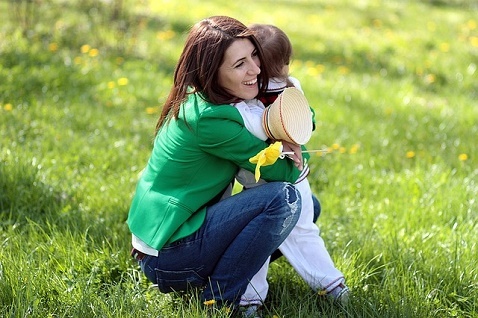
It’s an interesting time to be a mother. We are facing challenges no mother before us has faced, navigating the rough waters of constant social media and information consumption and raising children in an insta-everything world. We have more access to information than any generation before us, and we live, in fact, in a steady stream of it. Responsibilities are ever-growing and down time is ever-shrinking, and much threatens to chip away at our self-worth, our joy, and the time we spend with those we hold dear. In light of this, we need to think about guarding our own motherhood so that time is not lost that we cannot get back, so that our confidence doesn’t suffer regular blows, so that our self-worth isn’t measured by the opinions of others, and so that we can find fulfillment and sustaining happiness in our lives. These are the 3 things I’m guarding against.
Information Overload
During the recent election cycle, my home seemed to be constantly filled with the voices of a particular news network. It was all I watched, and as I took in all of this information, my anxiety rose considerably. I have become more fearful and very often saddened by the news I have been consuming, yet I told myself I needed to be informed. In “ News is Bad for You and Giving Up Reading it Will Make You Happier ” by Rolf Dobelli, he makes a compelling argument for giving up reading and watching the news altogether, and I found this particularly interesting: “It constantly triggers the limbic system. Panicky stories spur the release of cascades of glucocorticoid (cortisol). This deregulates your immune system and inhibits the release of growth hormones. In other words, your body finds itself in a state of chronic stress.” That certainly explains my anxiety.
But news isn’t the only overload. As we scroll newsfeeds, we remain always informed about the goings on in the lives of friends and strangers alike, which makes comparison ever so easy. In addition, opinions are ever present and coming from all directions. Working in the field of parenting, I have read thousands of pieces on what we should and shouldn’t do to raise our kids well, and sometimes I wonder what kind of parent I would have been without all the voices. Being overwhelmed with such conflicting information on raising children eats at our self-assurance and leaves us always questioning “am I doing the right thing?”
To guard against information overload, I now check the news channel briefly for headlines and then turn it off. I don’t linger to listen to the details. I am selective about the articles I consume, both in number and substance. Not only does limiting the information I take in lessen my anxiety which automatically has a more positive effect on my family, but less time spent scrolling, watching, and reading means more time spent playing, laughing, and talking.
Being self-controlled with news and social media also sets an example for my tween son who recently told me, “Mom, I’m going to limit the amount of time I spend on my iPad.” They are always watching us and taking cues from how we handle life.
A study found that “people who made frequent social comparisons were more likely to experience envy, guilt, regret, and defensiveness and to lie, blame others, and to have unmet cravings.” They further assert, “People who tend to make spontaneous social comparisons, therefore, tend to be unhappy, more vulnerable to the affective consequences of such comparisons, and more likely to get caught in a cycle of constantly comparing themselves to others, being in a self-focused state, and consequently being unhappy. More social comparisons, rather than serving a useful, coping function, merely serve to reinforce the cycle tying social comparisons to diminishing well-being.” (White, Langer, Yariv, and Welch)
This certainly seems to prove Theodore Roosevelt right when he said that “Comparison is the thief of joy,” but anyone who has been caught in the cycle of comparison could have confirmed this to be true. To guard against this thief, I practice gratitude daily. Gratitude is the antidote to comparison, and drawing my focus to the blessings of my own life makes me feel more content, happy, and fulfilled. I have found that keeping a gratitude journal is helpful for daily practice.
Busyness and Distractions
There is never a shortage of things to do, is there? I’m finding that, as my kids get older, it’s actually more difficult to spend down time together. Even though they take part in very limited extracurricular activities, just getting through homework and the evening chores seems to eat up most of our time together. Sometimes they finish up homework and disappear to pursue their own interests (read: X Box and Lego building) and I have to go hunt them down to get a hug. Not only am I busy, but they’re at the age where they’re pretty busy too, and I have to make a real effort to bring us all together for a little hygge .
Hygge is exactly how I’m guarding against busyness and distractions. Read more about hygge here. Each night, we cozy up together in the bed and I read aloud to them. This serves to bring us back to each other every evening before sleep. We also have designated movie nights or game time when distractions are put away and we give full attention to each other.
There is so much more than can be said about guarding motherhood, but take a few moments today to think about what is stealing and contributing to your joy, what is influencing your mind both positively and negatively, and what you want most out of life. Think about how you can protect what is sacred to you and what you need to find fulfillment and sustaining happiness in motherhood.
*This was originally published at Creative Child Magazine.

Published on February 03, 2017 07:07
Guarding Motherhood
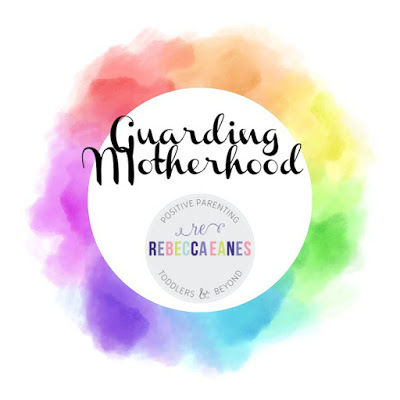
It’s an interesting time to be a mother. We are facing challenges no mother before us has faced, navigating the rough waters of constant social media and information consumption and raising children in an insta-everything world. We have more access to information than any generation before us, and we live, in fact, in a steady stream of it. Responsibilities are ever-growing and down time is ever-shrinking, and much threatens to chip away at our self-worth, our joy, and the time we spend with those we hold dear. In light of this, we need to think about guarding our own motherhood so that time is not lost that we cannot get back, so that our confidence doesn’t suffer regular blows, so that our self-worth isn’t measured by the opinions of others, and so that we can find fulfillment and sustaining happiness in our lives. These are the 3 things I’m guarding against.
Information Overload
During the recent election cycle, my home seemed to be constantly filled with the voices of a particular news network. It was all I watched, and as I took in all of this information, my anxiety rose considerably. I have become more fearful and very often saddened by the news I have been consuming, yet I told myself I needed to be informed. In “ News is Bad for You and Giving Up Reading it Will Make You Happier ” by Rolf Dobelli, he makes a compelling argument for giving up reading and watching the news altogether, and I found this particularly interesting: “It constantly triggers the limbic system. Panicky stories spur the release of cascades of glucocorticoid (cortisol). This deregulates your immune system and inhibits the release of growth hormones. In other words, your body finds itself in a state of chronic stress.” That certainly explains my anxiety.
But news isn’t the only overload. As we scroll newsfeeds, we remain always informed about the goings on in the lives of friends and strangers alike, which makes comparison ever so easy. In addition, opinions are ever present and coming from all directions. Working in the field of parenting, I have read thousands of pieces on what we should and shouldn’t do to raise our kids well, and sometimes I wonder what kind of parent I would have been without all the voices. Being overwhelmed with such conflicting information on raising children eats at our self-assurance and leaves us always questioning “am I doing the right thing?”
To guard against information overload, I now check the news channel briefly for headlines and then turn it off. I don’t linger to listen to the details. I am selective about the articles I consume, both in number and substance. Not only does limiting the information I take in lessen my anxiety which automatically has a more positive effect on my family, but less time spent scrolling, watching, and reading means more time spent playing, laughing, and talking.
Being self-controlled with news and social media also sets an example for my tween son who recently told me, “Mom, I’m going to limit the amount of time I spend on my iPad.” They are always watching us and taking cues from how we handle life.
A study found that “people who made frequent social comparisons were more likely to experience envy, guilt, regret, and defensiveness and to lie, blame others, and to have unmet cravings.” They further assert, “People who tend to make spontaneous social comparisons, therefore, tend to be unhappy, more vulnerable to the affective consequences of such comparisons, and more likely to get caught in a cycle of constantly comparing themselves to others, being in a self-focused state, and consequently being unhappy. More social comparisons, rather than serving a useful, coping function, merely serve to reinforce the cycle tying social comparisons to diminishing well-being.” (White, Langer, Yariv, and Welch)
This certainly seems to prove Theodore Roosevelt right when he said that “Comparison is the thief of joy,” but anyone who has been caught in the cycle of comparison could have confirmed this to be true. To guard against this thief, I practice gratitude daily. Gratitude is the antidote to comparison, and drawing my focus to the blessings of my own life makes me feel more content, happy, and fulfilled. I have found that keeping a gratitude journal is helpful for daily practice.
Busyness and Distractions
There is never a shortage of things to do, is there? I’m finding that, as my kids get older, it’s actually more difficult to spend down time together. Even though they take part in very limited extracurricular activities, just getting through homework and the evening chores seems to eat up most of our time together. Sometimes they finish up homework and disappear to pursue their own interests (read: X Box and Lego building) and I have to go hunt them down to get a hug. Not only am I busy, but they’re at the age where they’re pretty busy too, and I have to make a real effort to bring us all together for a little hygge .
Hygge is exactly how I’m guarding against busyness and distractions. Read more about hygge here. Each night, we cozy up together in the bed and I read aloud to them. This serves to bring us back to each other every evening before sleep. We also have designated movie nights or game time when distractions are put away and we give full attention to each other.
There is so much more than can be said about guarding motherhood, but take a few moments today to think about what is stealing and contributing to your joy, what is influencing your mind both positively and negatively, and what you want most out of life. Think about how you can protect what is sacred to you and what you need to find fulfillment and sustaining happiness in motherhood.
*This was originally published at Creative Child Magazine.

Published on February 03, 2017 07:07
January 30, 2017
21 Ways to Reach a Child's Heart
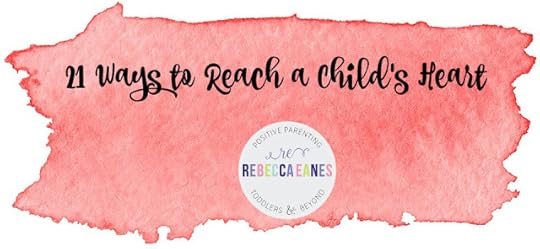
“We were never meant to take care of children whose hearts we did not have, and that includes our teenagers. When they are not in right relationship with us, their instincts are to resist us, to oppose us, to shy away from us.” – Dr. Gordon Neufeld
Dr. Neufeld’s work in attachment theory has been instrumental in the way I now view children, childhood, and my role as a parent. Specifically, my understanding that children are not meant to follow those to whom they are not attached was a pivotal point in my journey as a mom. What does it mean to have your child’s heart? Let’s clear up the misconceptions first.
First, being in right relationship, or securely attached, does not mean that you must always do what makes your child happy. There will be times when your parental decisions do not please your children, yet you know your decision is in their best interest. They are not yet mature enough to understand this, but you are, and this is why they are entrusted to you. Attached parenting is not about walking on eggshells so as not to upset your kid, but rather it’s about standing confident in the truth that you are your child’s best bet, the one who knows what they need and how to take care of them, and you do so with a quiet strength and assured gentleness.
Secondly, having your child’s heart does not mean you are peers or are on level playing field. It does not require you to give up your authority as a parent, and in fact enables you to have true, genuine authority rather than forced authority. When you have your child’s heart, they trust you. They look up to you. They follow your lead intuitively and this is how parenting was meant to work. Unfortunately many of today’s parenting practices sabotage this in favor of a false or forced authority. We threaten to take away the things that mean the most to them or we withdraw the invitation for them to be around us until they do what we want them to do, and this power play gets results but breaks the heart ties.
Lastly, having your child’s heart does not mean that there is never any conflict. Even a parent and child who is connected at the heart will have moments of disconnection. Troubles will still arise from time to time because such is the case when two or more imperfect humans are in relationship with one another. However, having your child’s heart does greatly improve cooperation and peace.
Below are 21 ways to reach a child’s heart.
Listen with the intent to understand their point of view and feelings.Speak to them respectfully, even when you issue requests or correct them.Believe in their goodness and tell them that you believe.Put away your devices and distractions and spend time focused on them.Read to them.Hug them often.Ask “How can I help?”Correct without criticism.Speak life-giving, encouraging , affirming words to them daily.Play what they want to play.Show them that their opinions are valuable.Thank them for their contributions to the family.Let them hear you speak kindly of them to others.Empathize with their emotions, even the tough ones.Be silly with them. Laugh a lot. Let them remember your smile.Greet them warmly.Allow room for mistakes.Call them by a special nickname.Be generous with your “yes” and confident with your “no.”Tell them stories from your youth so they’ll know you better.Show interest in the things they care about.This post was originally published at Creative Child Magazine.

Published on January 30, 2017 17:29



